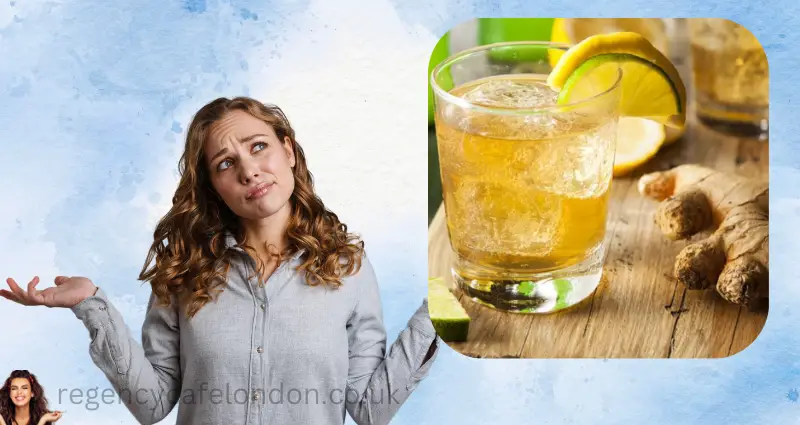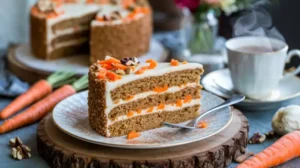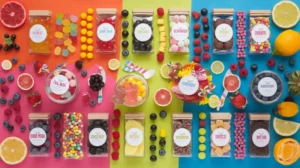Ginger ale, a popular fizzy beverage often enjoyed for its light, spicy-sweet flavor, is commonly consumed as a refreshing drink or as a remedy for mild digestive discomfort.

However, for those mindful of their caffeine intake, a key question arises: Does ginger ale have caffeine in it?
This detailed guide explores everything you need to know about ginger ale and caffeine, from its composition and types to frequently asked questions and related health considerations.
1. What Is Ginger Ale?
Ginger ale is a carbonated soft drink flavored primarily with ginger. It comes in two main styles:
- Traditional Ginger Ale: This is the classic, fermented version with a rich, natural ginger flavor, made using ginger root, sugar, and yeast.
- Commercial Ginger Ale: Commonly found in stores, it is a non-alcoholic version with carbonated water, ginger flavoring (natural or artificial), sweeteners, and preservatives.
Uses of Ginger Ale:
- Served as a mixer in cocktails (e.g., whiskey ginger).
- Used as a home remedy for nausea and motion sickness.
- Enjoyed as a standalone beverage.
2. Understanding Caffeine in Beverages
Caffeine is a natural stimulant found in coffee, tea, chocolate, and some sodas. Many people consume it daily for its energizing effects. Here’s a quick overview:
| Source | Caffeine Content (Per 12 oz) |
|---|---|
| Coffee | 140-200 mg |
| Black Tea | 50-70 mg |
| Cola Sodas | 30-40 mg |
| Energy Drinks | 80-160 mg |
Caffeine sensitivity varies among individuals, making it important to monitor intake. While caffeine is present in many sodas, not all soft drinks, such as ginger ale, contain it.
3. Is Ginger Ale Caffeinated?
General Answer: No, Ginger Ale Is Typically Caffeine-Free
Most ginger ale brands do not contain caffeine, making it a suitable option for those avoiding stimulants. This sets ginger ale apart from caffeinated sodas like cola or certain root beers.
However, exceptions exist, and some specialty ginger ale products may include caffeine for added energy or unique formulations. Therefore, always check the ingredient label or product description for clarification.
4. Comparison of Popular Ginger Ale Brands
The table below compares the caffeine content, sweeteners, and flavors of leading ginger ale brands:
| Brand | Caffeine Content | Sweetener | Unique Features |
|---|---|---|---|
| Canada Dry | 0 mg | High Fructose Corn Syrup / Sugar | Mild ginger flavor, widely available |
| Schweppes | 0 mg | High Fructose Corn Syrup / Sugar | Crisp, clean taste |
| Seagram’s Ginger Ale | 0 mg | High Fructose Corn Syrup / Sugar | Balanced sweetness and ginger |
| Reed’s Extra Ginger Brew | 0 mg | Cane Sugar | Strong ginger kick, natural flavor |
| Zevia Ginger Ale | 0 mg | Stevia (Zero Calorie) | Sugar-free, calorie-free option |
| Fever-Tree Ginger Ale | 0 mg | Cane Sugar | Premium ingredients, robust flavor |
Key Takeaway: None of these mainstream ginger ale brands contain caffeine, affirming that ginger ale is a safe, non-stimulating choice.
5. Benefits and Drawbacks of Caffeine-Free Drinks
For individuals monitoring their caffeine intake, consuming ginger ale offers several advantages:
Benefits
- No Stimulant Effects: Caffeine-free drinks avoid side effects like jitters, insomnia, or heart palpitations.
- Accessible for All Ages: Suitable for children, pregnant individuals, and caffeine-sensitive people.
- Digestive Aid: Ginger content may help soothe nausea or indigestion.
Drawbacks
- Lacks Energy Boost: Those seeking an energizing effect might miss the stimulating properties of caffeine.
- Sugar Content: Many ginger ales are high in sugar, which could contribute to weight gain or blood sugar spikes.
For a healthier choice, opt for low-sugar or naturally sweetened ginger ale.
6. FAQs About Ginger Ale and Caffeine
1. Can ginger ale ever contain caffeine?
Yes, though rare, some energy-focused or specialty versions of ginger ale may include caffeine. Always check the label for clarity.
2. How can I confirm whether a ginger ale brand is caffeine-free?
Look for “Caffeine-Free” on the packaging, or review the ingredient list. Brands like Canada Dry and Schweppes explicitly state their products are caffeine-free.
3. Is ginger ale a healthy alternative to caffeinated drinks?
It can be, especially if consumed in moderation and with attention to sugar content. Ginger ale lacks caffeine and provides mild digestive benefits, but excessive sugar consumption can negate its advantages.
4. What about diet ginger ale? Does it have caffeine?
No, most diet ginger ale versions (e.g., Canada Dry Diet) are also caffeine-free, with artificial sweeteners replacing sugar.
5. Are there naturally caffeinated ginger beverages?
Some craft ginger beers or ginger-infused energy drinks may include caffeine. These are not traditional ginger ales.
7. Conclusion
To sum up, traditional and commercial ginger ale varieties are overwhelmingly caffeine-free, making them a popular choice for individuals seeking a non-stimulant soft drink. However, it’s wise to read labels, especially for specialty or craft versions that might include caffeine.
By choosing ginger ale, you enjoy the unique taste of ginger without the effects of caffeine, making it suitable for all ages and times of the day. Whether you’re sipping Canada Dry at a party or using Reed’s Extra Ginger Brew to calm your stomach, ginger ale remains a versatile and enjoyable beverage.
Table Recap: Caffeine in Beverages
| Beverage Type | Typical Caffeine Content |
|---|---|
| Coffee | 140-200 mg |
| Tea | 50-70 mg |
| Cola | 30-40 mg |
| Ginger Ale | 0 mg (typically) |
With its refreshing fizz and caffeine-free profile, ginger ale continues to delight and comfort people worldwide. Next time you pick up a can or bottle, enjoy it with the assurance that you’re avoiding caffeine—unless the label says otherwise!




